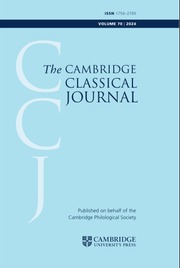Article contents
Socrates on life and death (Plato, Apology 40C5–41C7)*
Published online by Cambridge University Press: 06 March 2012
Extract
In a familiar passage at the end of Plato's Apology, Socrates offers an account of what he believes will happen to us when we die. As in the Phaedo, it is his impending death that prompts Socrates to speculate about the nature of the afterlife: as soon as his verdict is announced, Socrates turns to the jury to gloss on his sentencing. It was unprecedented, as far as we know, for a defendant in the Athenian court to end his trial by addressing the members of the jury, but the Apology has Socrates doing just that. While his defence in the Apology was already audacious, Socrates' closing speech appears even more provocative. Among other things, he declares that he has no reason to fear death, but that, on the contrary, the death penalty he received only moments before may well be considered a blessing. Socrates supports this claim with an argument in the form of a constructive dilemma: either death involves the cessation of consciousness, in which case our afterlife existence will resemble a single night of dreamless sleep, or after our death we will go to a place where all the dead are ruled over by just judges. Since either scenario constitutes a good state, death should be considered something good (40C5–41C7). This article will examine Socrates' argument in detail and discuss a number of salient problems that arise from it. Commentators have typically attempted to tackle the interpretative problems one by one, but I shall argue that they resist satisfactory resolution and instead alert us to an ironic reading of this passage.
- Type
- Research Article
- Information
- Copyright
- Copyright © The Author(s). Published online by Cambridge University Press 2011
References
WORKS CITED
- 2
- Cited by


